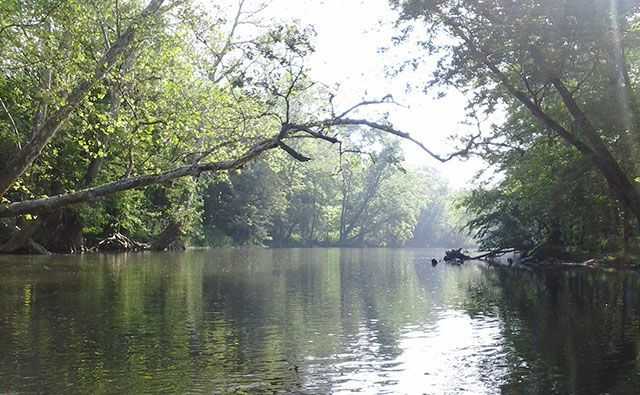When you first visit a new-to-you body of water, there are various tools that allow you to be a more productive fisherman. One constant factor that limits a kayak angler is the limited range one can travel in a kayak. A kayak angler does not have the luxury of being able to cover great distances like a powered craft searching for fish. It is very important the decisions made about where to put in, where to fish and how to fish are made before getting on the water. These decisions could exponentially increase or decrease the chance of success.
We use depth finders and GPS to give us information on the depth, structure, fish, forage, location and water temp while on the water. We also use our cumulative knowledge to put us on fish in a new fishery. However, there are some very productive means of doing homework at your computer prior to leaving home that will increase your chances of success greatly.
Google Earth is fantastic; it gives a satellite view of the fishery. You can zoom in, and in many cases, depending on water depth and clarity, see the bottom features or shallow areas. Used in conjunction with a topographical map that shows contour lines and depth below the surface, one can identify and plot coordinates for areas likely to hold fish. Google Earth also helps identify fi shy-looking features along the banks. Th ere is a tool for saving coordinates and converting them to a format you can load into a Lowrance unit, allowing you to navigate to the exact location.
Another tool at your disposal is knowledge of whatever species of game fish you intend to catch. This one is perhaps the most important. You must do your homework to understand what types of areas you need look for fish. Being familiar with the seasonal patterns, diet, available forage and habits of any given fish will help you make informed decisions about where to fish. Keep in mind that the habits of a single species of fish may vary from one fishery to another. Do not take a shortcut here, as not being familiar with these things will cause you to make bad decisions about where to fish, when to fish, what bait or lures to use and what techniques to use.
Of course one cannot discount local knowledge; there is a wealth of information out there possessed by the people who fish any given fishery regularly. This one is a little tougher, simply because a lot of people are secretive about their fishing spots. Sometimes they will tell you nothing or give you misinformation. A good source for this info is online forums. You can read fishing reports, and if they give general locations in their posts, you can look at the date and make mental notes about that location. You can also ask questions about a particular fishery. There is usually someone glad to share information. On the kayak fishing forums I regularly read, there is almost always someone glad to actually go out with you and help you get on fish.
Before going out blindly and fishing in all the wrong spots with all the wrong techniques and all the wrong lures or baits, do your research and gather as much information as possible. By connecting all the pieces you can before hitting the water, you will be much more likely to catch fish.
